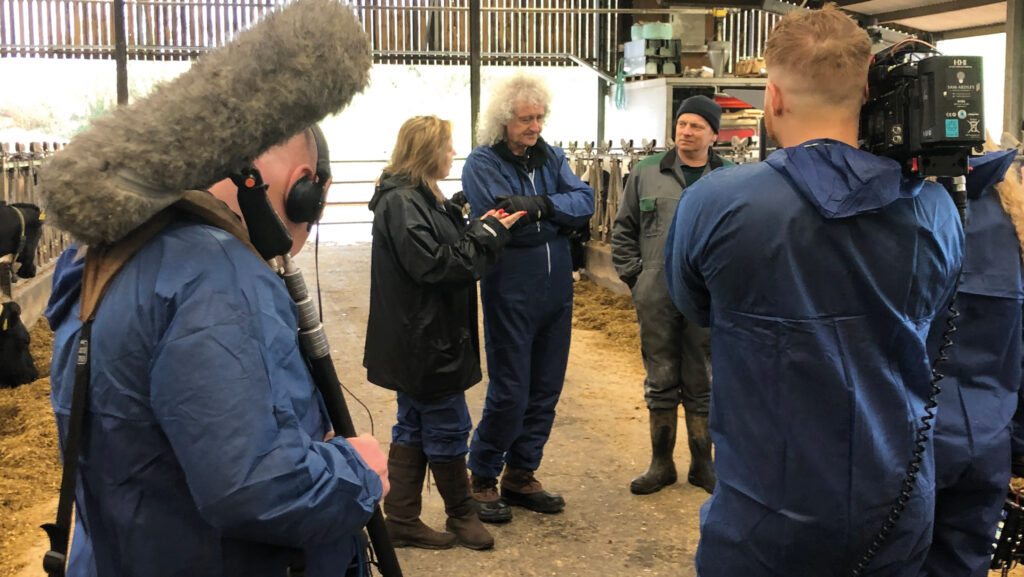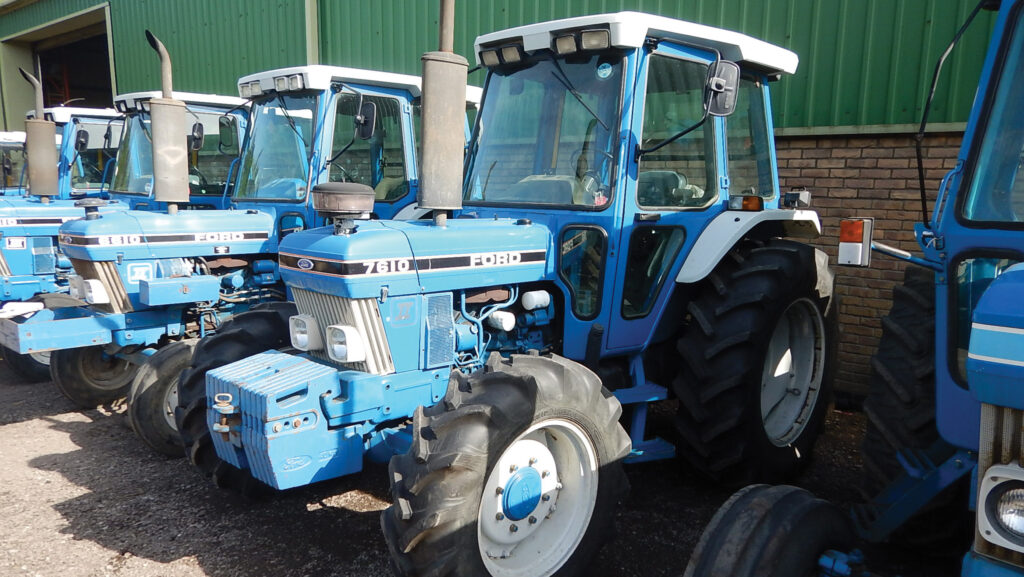Review of the Year 2024: From Brian May to beefy farmers
 © Telling Photography
© Telling Photography From celebrations to commiserations – Farmers Weekly takes you through the A-Z of this year’s agricultural highs and lows. In this article, we look at N-T…
See also: Brian May – ‘Badgers are irrelevant in cattle TB spread’
N is for “Nothing to see here”

Brian May and film crew © Save Me Trust
Sir Brian May’s BBC documentary The Badgers, the Farmers and Me reignited the debate over badger culling, with the Queen guitarist claiming badgers are wrongly blamed for spreading bovine tuberculosis (TB).
In the programme, aired on 23 August, Sir Brian argued that badgers are “scapegoats” and that slurry contaminated with TB bacteria – rather than infected wildlife – is the primary culprit.
Badgers are being “brutally persecuted for a crime they didn’t commit”, he stated, claiming that Gatcombe Farm in Devon became clear of the disease in 2018 without culling badgers.
However, critics pointed out that Gatcombe has suffered renewed TB outbreaks since then, which Sir Brian attributed to limitations on enhanced cattle testing, not infected badgers.
Farming and veterinary groups criticised the documentary for omitting key evidence. NFU deputy president David Exwood called it “fundamentally flawed”, while Cambridge University’s Prof James Wood said it was “grossly irresponsible” to downplay badgers’ role in the transmission of the disease.
Experts agreed that successful bovine TB management requires a multi-pronged approach, including cattle testing, biosecurity, and wildlife management.
O is for “Officeholders”
February’s NFU officeholder elections in Birmingham marked an emotional farewell to Minette Batters, who had served as president since 2018.
Tom Bradshaw succeeded her, while David Exwood was promoted to NFU deputy president, and Rachel Hallos won the race for vice-president.
In July, Mrs Batters was elevated to the House of Lords, receiving the title of Baroness Batters, taking up her position after the summer recess. “Farming’s voice has not had the weight behind it, either in the Commons or the Lords, so I hope that can change,” she told Farmers Weekly.
The NFU Scotland presidential elections, scheduled for 7 February 2025 at the union’s annual meeting in Glasgow, are gaining momentum.
Current president Martin Kennedy will step down after completing his maximum two terms of two years each. Both of the union’s vice-presidents, Andrew Connon from Aberdeenshire and Alasdair Macnab from the Highlands, have announced their intention to run for the presidency
P is for “Popularity”
The five most-read news stories on our website FWi this year were:
- Farmers barricade fly-tippers after catching them in the act (Feb 2024)
- Arla faces backlash over trials with methane reducing Bovaer (Dec 2024)
- Illegal meat seized at Dover in ‘unprecedented volumes’ (Jan 2024)
- Farmer to pay £3,500 for letting grandson ride in tractor (Aug 2024)
- Welsh dairy farmers fined over slurry store collapse (June 2024)
Q is for “Question of sport”

Winners of this year’s Britain’s Fittest Farmer (clockwise from top left): William Arden, Michael Georgiou, Anne Grindal and Emily Ashford © Telling Photography
The 2024 Britain’s Fittest Farmer competition, an annual Farmers Weekly initiative, concluded with four winners showcasing remarkable physical and mental resilience.
Held at Tom Kemp’s farm in Essex in September, the event highlighted the importance of fitness and mental health awareness in agriculture. Each winner received a £1,000 prize.
Emily Ashford, a South Devon farmer and former Team GB rower, secured the Women under 40s title. Emily, deeply affected by her own farm’s experiences, used the platform to raise awareness of the mental health challenges farmers face during TB outbreaks.
William Arden, an arable and deer farmer from Lincolnshire, claimed victory on his fifth attempt in the Men under 40s category. Owner of The Farmyard Gym, William highlighted how fitness fosters mental resilience in farming.
Anne Grindal, a Warwickshire farmer’s wife and equestrian coach, triumphed in the Women over 40s category after finishing second in 2023, while Michael Georgiou, a Carmarthenshire pig farmer, won the Men over 40s category.
R is for “Review”
Red Tractor confirmed that it was scrapping its controversial Greener Farms Commitment in March, as two reviews into farm assurance schemes gathered momentum.
The reviews aim to tackle concerns about excessive bureaucracy, high costs for farmers, and inadequate rewards, with critics arguing that assurance schemes prioritise paperwork over meaningful improvements in farm standards.
Farming unions and industry groups are also seeking greater transparency and reduced duplication and costs.
As the UK’s leading farm assurance body, Red Tractor defends its role in maintaining consumer trust. The reviews are also assessing whether to recognise and incentivise farmers meeting elevated environmental or welfare criteria.
Results are expected in early 2025 and could reshape farm assurance across the sector.
S is for “Slipping and sliding”

Classic 1980s machinery has been more sought after © Cheffins
It’s not been a great year for tractor manufacturers. Registrations were down 15% on the year to November, the lowest for any month since December 2000.
“The market is being affected by the low level of confidence among farmers, due to a combination of lower prices, high input costs, poor weather and political uncertainty,” said the Agricultural Engineers Association.
Despite – or maybe because of – this slump, second-hand machinery has been more sought after, especially among the “later classics”.
One four-wheel drive 1988 Ford 7610 made £31,000 at a Lincolnshire farm sale in July, while a 1985 MB-Trac 1500 topped £51,000 at the Yorkshire Showground in August.
T is for “Timber”
Welsh government plans to require every farm in Wales to have 10% tree cover if they wanted to receive any public money under the Sustainable Farming Scheme (SFS) went down like a lead balloon with farmers.
Apart from the impracticality, they feared the value of their land would also plummet.
NFU Cymru officeholders said they would not join the scheme if this was required of them – a sentiment felt by others.
With a new minister at the helm, the Welsh government did at least start to listen, setting up a new “roundtable” and taking fresh expert advice over the summer.
Deputy first minister Huw Irranca-Davies used the platform of the Royal Welsh Winter Fair at Llanelwedd to announce that the measure was being scrapped.
But the Welsh government hasn’t given up on it completely. It is setting a scheme-level tree planting target, and every farmer who wants a baseline payment from the SFS will need to devise an active tree planting plan.
